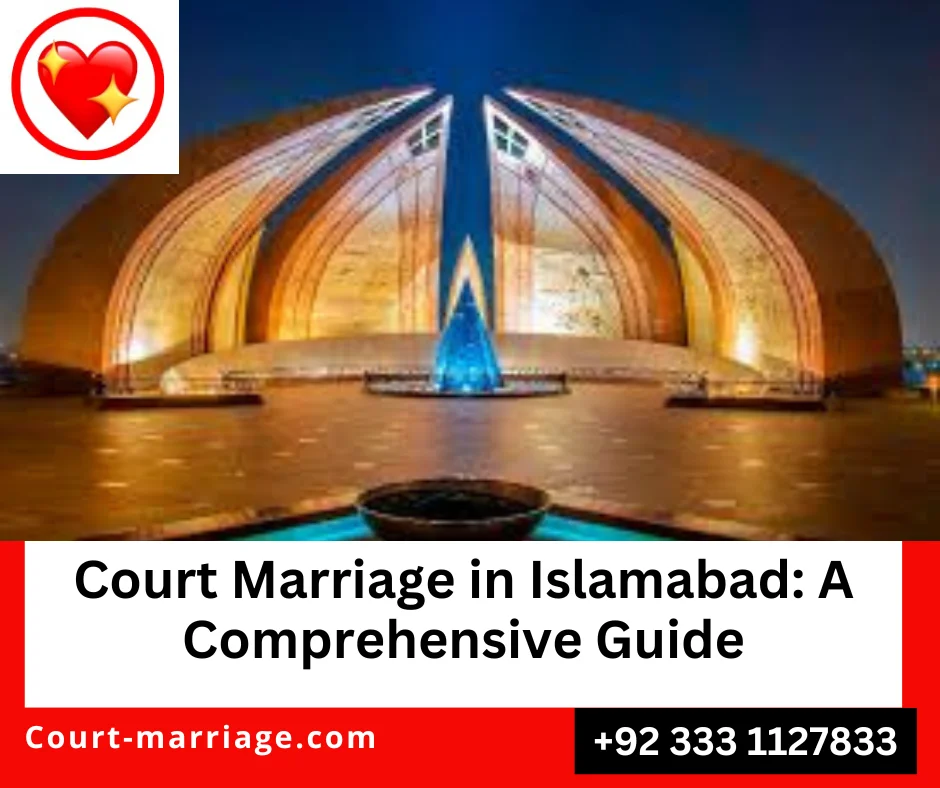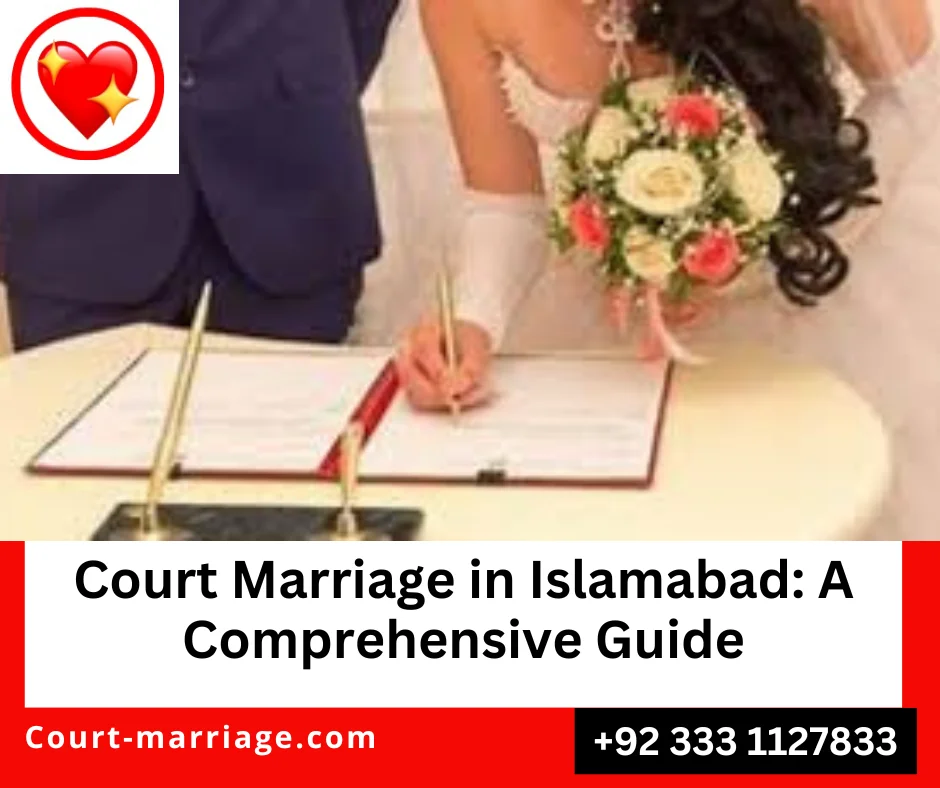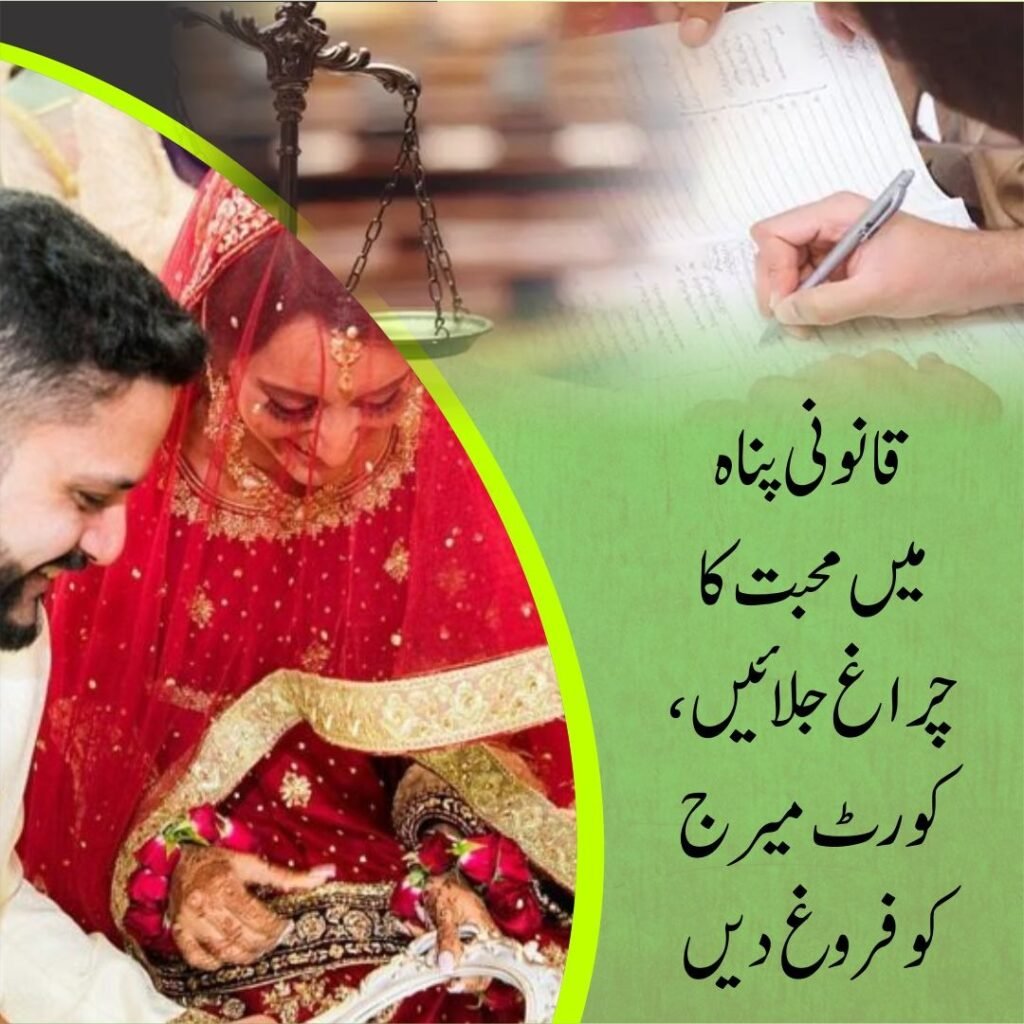Court Marriage in Islamabad: A Comprehensive Guide
Understanding Court Marriage in Islamabad
Court marriage is a legal union that takes place in a court of law, designed to simplify the marriage process for couples. In the context of Islamabad, the capital city of Pakistan, court marriages offer a streamlined alternative to traditional marriages, which often involve elaborate ceremonies, customs, and significant planning. This type of marriage is particularly appealing to couples who prefer a more straightforward approach or those who face barriers in obtaining traditional marriage services due to cultural or social differences.
Unlike conventional marriages, which may require extensive rituals and gatherings, court marriages focus on legal formalities. The process is uncomplicated: couples must present themselves along with necessary documentation, including identity cards, affidavits, and other proof of eligibility. Upon fulfilling these requirements, a civil judge or magistrate officiates the marriage, thereby granting the couple a marriage certificate that has legal recognition. This legal framework ensures that both parties are treated equally and that their rights as married couples are protected under Pakistani law.
The significance of court marriage in Islamabad cannot be understated. It provides a viable option for individuals wishing to marry without the societal expectations often associated with traditional practices. Moreover, court marriages can be completed in a matter of hours, offering a prompt solution for couples who may be in urgent situations, such as pregnancy or family opposition. As such, this legal process has gained popularity among diverse groups, including inter-faith couples and those from different socioeconomic backgrounds, allowing them to formalize their relationships in a way that aligns with their circumstances. Overall, court marriage in Islamabad exemplifies the evolution of marital practices in contemporary society.
Legal Requirements for Court Marriage
Obtaining a court marriage in Islamabad requires compliance with specific legal requirements established by local regulations. The first and foremost step is to ensure that both parties meet the eligibility criteria. In Pakistan, the minimum legal age for marriage is 18 years for males and 16 years for females, although individuals should be of the age of maturity to fully understand the commitment involved.
Both parties must provide valid identification documents. The required documents typically include Computerized National Identity Cards (CNIC) of both individuals, which serve as proof of identity and age. Additionally, in some cases, witnesses are required to be present during the marriage ceremony. For this, two witnesses, preferably over the age of 18, must carry their CNICs as well.
Furthermore, it is imperative for both parties to not be closely related, as consanguinity restrictions apply to court marriages. The legal framework in Islamabad prohibits marriages between specific relatives to prevent any potential issues that may arise from familial ties. This is known as Harem prohibitions under Islamic law.
Once you have gathered the necessary documents, the next step involves visiting the local marriage registrar’s office. Here, you will need to fill out the application form for court marriage, which typically requires personal details, including names, addresses, and the nature of your relationship. After submitting the application along with the required documents, the registrar will set a date for the marriage ceremony.
Finally, the couple will sign the marriage contract (Nikah Nama) in the presence of the registrar and witnesses, finalizing the court marriage. Understanding these legal requirements is crucial for a smooth court marriage process in Islamabad, ensuring that all local regulations are respected and fulfilled.


The Court Marriage Procedure
Court marriage in Islamabad is a streamlined process designed to facilitate couples who wish to formalize their union in a legal framework. The procedure begins with the submission of an application, either by the couple themselves or through legal representatives. The application must be submitted to the relevant court or registrar in the jurisdiction where the marriage will take place.
Initially, both parties need to gather requisite documents, including valid identification such as National Identity Cards (NIC) or passports, along with photographs and, if applicable, divorce certificates or death certificates if either party has been previously married. Having all paperwork in order is crucial to ensure a smooth application process. It is advisable to check with the specific court for any additional requirements regarding documentation.
Once the application is submitted, the couple must secure an appointment with the court registrar. During the appointment, the couple will be asked relevant questions regarding their intent to marry, and both parties must appear in person. The registrar will review the documents, and upon satisfactory verification, they will proceed to issue a marriage certificate. Depending on the court’s workload, there may be a waiting period for the marriage certificate to be processed. It is essential for couples to anticipate this timing when planning their ceremony.
Additionally, there may be fees associated with the court marriage process, which can vary depending on the court and the specific services rendered. Couples should ensure they are informed about any potential costs to avoid unexpected financial obligations. It is also recommended to consult with legal or marriage experts for guidance throughout the process. Following the successful completion of all procedures, a simple court marriage ceremony will take place, officially recognizing the union before witnesses, after which the couple will receive their marriage certificate.
Advantages of Court Marriage
Court marriage offers numerous advantages that make it a compelling option for couples seeking to formalize their union. One of the primary benefits is the legal security it provides. In many jurisdictions, court marriage is recognized as a valid legal contract, ensuring that the rights of both partners are protected under the law. This legal recognition can help prevent potential disputes regarding property or parental rights, which may arise in the absence of official documentation. Couples can enjoy the peace of mind that comes from knowing their marriage is legally acknowledged.
In addition to enhanced legal security, court marriage is often distinguished by increased privacy. Unlike traditional weddings, which can sometimes involve large gatherings and public displays, court marriages are typically conducted in a more private setting, usually within a courtroom. This can be particularly appealing to couples who prefer to keep their marital status away from public scrutiny. The discreet nature of court marriages allows couples to celebrate this significant milestone without the pressures and expectations that may accompany a traditional ceremony.
Time efficiency is another considerable advantage of court marriage. Conventional wedding planning can take months, if not years, involving numerous arrangements and logistics. In contrast, court marriage is relatively straightforward and can often be arranged within a matter of days. For couples wishing to expedite their union due to various circumstances—such as urgent immigration needs or personal reasons—this quick turnaround can be invaluable. Additionally, the potential cost savings associated with court marriage cannot be overlooked. The expenses related to hosting a traditional wedding, including venue booking, catering, and entertainment, can accumulate rapidly. Court marriages typically minimize these costs, making them an economically prudent option for many couples.
Real-life testimonials from couples who have chosen court marriage often highlight these various benefits. Many individuals express satisfaction with the streamlined process and the emotional relief that comes from having their relationship formally recognized without the burdens associated with traditional weddings. Ultimately, court marriage serves as a practical solution that aligns with modern couples’ needs and desires for a hassle-free legal union.


Challenges and Considerations
Choosing court marriage in Islamabad presents various challenges and considerations that couples should be prepared to face. One significant aspect is the societal perception of court marriages, which can differ greatly among families and communities. Some may view court marriage as a non-traditional choice, prompting backlash or disapproval, which can lead to emotional strain on the couple. Navigating these societal expectations and familial pressures requires strong communication and mutual support between partners.
Furthermore, navigating the legal process associated with court marriage can pose its own set of challenges. While the procedure is designed to be straightforward, couples may encounter bureaucratic hurdles or misunderstandings regarding documentation requirements. It is advisable for couples to familiarize themselves with the necessary paperwork, including identification documents and marriage registration forms, to ensure a smooth process. Seeking assistance from legal experts, if necessary, can alleviate confusion and streamline the experience.
On an emotional level, couples might experience stress stemming from societal judgment or familial disapproval. This emotional strain can be exacerbated during the waiting periods for marriage registration or court hearing dates. It is imperative for couples to maintain open lines of communication, share their feelings, and establish coping mechanisms. Private counseling or support groups can offer a safe space for couples to express their concerns and receive professional guidance.
To overcome these challenges, couples can proactively engage in discussions with their families about their intentions, clarifying their reasons for choosing court marriage. Educating family members about the legal and personal significance of this choice can foster understanding and acceptance. Couples should also consider planning their wedding in a manner that includes family members, potentially transitioning initial resistance into support. By prioritizing transparency, communication, and education, couples can effectively navigate the complexities surrounding court marriage in Islamabad.
Post-Marriage Formalities
Following a court marriage in Islamabad, it is imperative for couples to complete several formalities to ensure that their union is recognized legally. The most significant of these formalities involves the registration of the marriage certificate. The couple must approach the relevant office, usually the local Union Council, to register their marriage, which serves as a legal record of the union. The registration process requires the submission of essential documents, including national identity cards (CNIC) of both partners, two passport-sized photographs, and the original marriage certificate issued by the court.
Once the marriage is registered, the couple can obtain copies of the marriage certificate. These copies are crucial for various administrative processes, such as applying for visas, updating marital status in government documents, and for name changes. It is advisable to request several certified copies of the marriage certificate during the registration process to avoid repeated trips to the office later. Couples should clearly understand that the legal marriage certificate is a vital document and should be preserved securely as it may be required for future legal proceedings or applications.
Additionally, the couple may need to consider changing their names, if desired. This process typically involves drafting a name change affidavit and submitting it to the relevant authorities, where some institutions may require a copy of the marriage certificate as proof. It is essential to follow the specific procedures set forth by each institution to ensure smooth processing of the name change.
In summary, fulfilling these post-marriage formalities is essential for a couple’s legal recognition as spouses in Islamabad. Completing these steps diligently ensures a hassle-free experience in the future when accessing various legal and administrative services. Proper documentation and timely processing of marriage registration not only affirm the couple’s commitment but also facilitate their integration into the legal framework of marital status in Pakistan.


Cultural Perspectives on Court Marriage
Court marriage in Islamabad, as well as throughout Pakistan, is influenced by various cultural perspectives that shape societal attitudes towards this legal union. Traditionally, marriage in Pakistan has been a significant cultural event, often characterized by grand ceremonies and familial involvement. However, the concept of court marriage introduces a more modern, streamlined approach that often challenges these longstanding traditions.
In urban areas like Islamabad, attitudes towards court marriage are gradually shifting. Many young couples view this process as a means of asserting their independence from familial and societal pressures. Court marriage is perceived as a pragmatic solution that enables couples to formalize their relationship without the extensive rituals often associated with traditional weddings. This trend is particularly prominent among educated youth, who are more likely to prioritize personal choice over cultural norms. In contrast, rural communities tend to maintain conventional views regarding marriage. In these areas, court marriage is less accepted and can even lead to social stigma. Families often prefer traditional arrangements that adhere to cultural customs and values, viewing court marriages as a deviation from accepted norms.
The expectations placed on individuals by families can greatly influence their decisions about marriage. In many cases, families in rural settings exert considerable pressure on potential brides and grooms to conform to traditional practices. Consequently, the choice to pursue a court marriage may be met with resistance. Meanwhile, in urban contexts, there is a growing acceptance of personal autonomy, which reflects a more progressive attitude towards court marriage. This divergence highlights the complex interplay between traditional values and modern practices within the realm of marriage in Pakistan.
Ultimately, understanding these cultural perspectives is crucial for those considering court marriage, as they navigate both familial expectations and societal norms.
Frequently Asked Questions (FAQs)
Court marriage in Islamabad is often surrounded by various queries, and addressing these frequently asked questions can provide clarity to potential couples considering this option.
What is required for court marriage in Islamabad?
For a successful court marriage, both parties must provide their national identity cards (NICs), two passport-sized photographs, and a marriage registration application. It is also essential to ensure that both individuals meet the legal requirements set forth by Pakistani law.
Is court marriage recognized legally?
Yes, court marriage is legally recognized in Pakistan. Once the marriage is registered at the relevant court, it holds the same legal standing as traditional marriages. Couples are advised to obtain a marriage certificate, which serves as proof of their marital status.
How long does the court marriage process take?
The court marriage process typically takes a few hours to complete. However, factors such as scheduling, documentation, and any potential delays should be considered. Couples should plan ahead to ensure a smooth experience.
Can foreign nationals marry in Islamabad?
Foreign nationals can marry in Islamabad, but they must fulfill specific legal requirements. These may include providing a valid passport, a certificate of no objection from their embassy, and other relevant documents. It is advisable to check with local authorities or legal experts for detailed guidance.
What are common misconceptions about court marriages?
Common misconceptions include the belief that court marriages lack legitimacy or social acceptance. In reality, court marriages are entirely legitimate and recognized by the law. Additionally, the notion that court marriages are only for couples facing familial opposition is not accurate; many couples choose this route for convenience and a simplified process.
What happens after a court marriage?
After court marriage, couples can proceed with their lives like any other married couple. It is advisable to register the marriage with relevant authorities and inform family and friends as desired. Regular marriage responsibilities and commitments apply, and couples can enjoy their new life together legally.
By addressing these frequently asked questions, we aim to demystify the process of court marriage in Islamabad, providing essential information to help potential couples make informed decisions.

Conclusion and Final Thoughts
Throughout this comprehensive guide on court marriage in Islamabad, several key points have emerged that underline the relevance of this legal union in contemporary society. Court marriage, recognized for its expedited process and legal validity, offers couples a legitimate means to formalize their relationship without the complexities often associated with traditional marriages. This mode of marriage not only simplifies the legal requirements but also promotes the concept of personal choice, enabling partners to marry without familial or societal constraints.
Moreover, the increasing societal acceptance of court marriages signifies a shift towards recognizing personal autonomy and love as the foundations of matrimonial unions. The benefits of court marriage include privacy, minimal bureaucratic procedures, and the ability to enter into a marital contract that is respectful of both parties’ wishes. Such advantages make court marriage a significant option for many couples who aspire to eliminate potential complications in their marital journey.
As we reflect on the importance of court marriage in today’s context, it becomes evident that this process caters to a diverse spectrum of individuals seeking legal recognition of their relationships. Considering the challenges posed by traditional marriage customs, couples must explore the option of court marriage and understand its implications fully. Therefore, for those contemplating this significant step, it is advisable to seek comprehensive information and support. Legal advice can provide clarity and guidance, ensuring that couples navigate the marriage procedure seamlessly. Embracing the court marriage option may not only fulfill personal aspirations but also contribute to a growing understanding of relationship choices in society.
Some Usefull Links
Online Nikah
Online Shadi
Pakistani Nikah Nama
Online Nikah in Pakistan
NADRA Marriage Certificate
Online nikah & Marriage Documents
Online Nadra Marriage Certificate
English Nikah Nama Form
Urdu Nikahnama Form
Online Marriage in Islamabad
Online Nikah in Karachi
Court Marriage Process
Online Marriage in Urdu
Online Nikah World
Court Marriage in Pakistan
Online Shadi in Pakistan
Online Nikah nama Form
NADRA Marriage Certificates
Court Marriage Procedure
Nikah Khawan Services
Court Marriage & Nikah
Court Marriage Law
Court Marriage & Civil Marriage
Nikah Khawan
Online Marriage in Pakistan
Online Nikah Service For Overseas Pakistanis
Online Nikah in Islam
Is Online Marriage Valid?
Online Nikah Worldwide
Family & Divorce Lawyers

